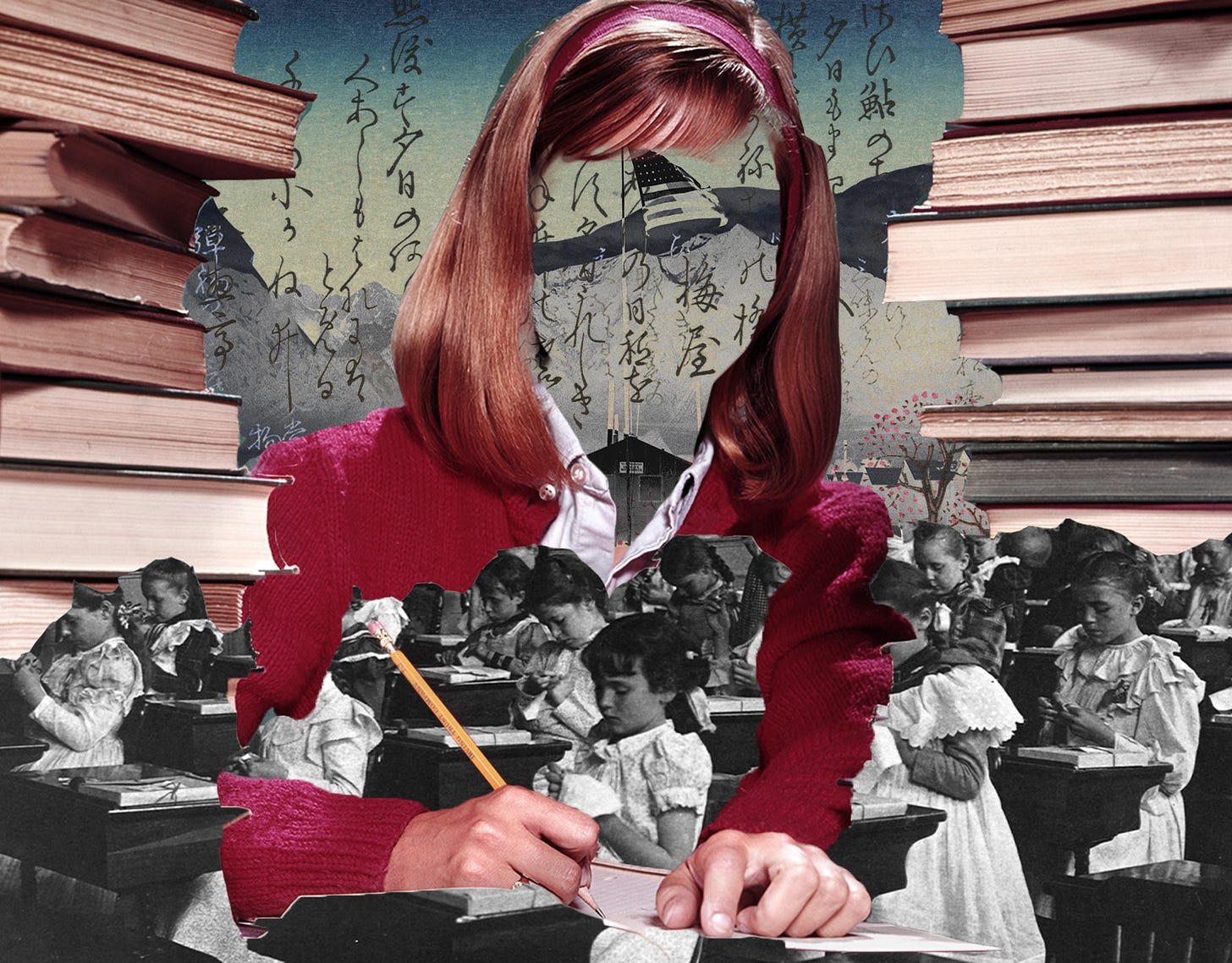
When a ‘Diverse’ Book Ban Goes Awry
A Wisconsin school board rejects an award-winning novel for being too one-sided about Japanese American internment during WWII.

Parents and community members in the deeply conservative city of Muskego, Wisconsin, are up in arms about a book recommended for use in a 10th-grade accelerated English class. The 2002 novel, When the Emperor Was Divine, is about a Japanese-American family during World War II, when some of its members were uprooted from their home in Berkeley, California, and sent to an internment camp in Utah.
The book—winner of an Alex Award from the American Library Association, an Asian American Literary Award, and, earlier this year, the Phoenix Award—was written by Julie Otsuka, based in part on her own family’s experience. A committee that selects books for the Muskego-Norway School District in southeastern Wisconsin recommended buying 60 copies of the book at an estimated cost of $916.80.
But the school board’s Educational Services Committee, at its June 13 meeting, decided to send the book recommendation back to the selection committee, from which it is not expected to return.
In the 2020 presidential election, the city of Muskego, home to the high school where Otsuka’s book was to be taught, voted for Donald Trump over Joe Biden by a margin of two to one. That’s even higher than the margin that voted for Trump in all of deep-red Waukesha County, in which Muskego resides. According to recent census data, Muskego’s population is 96.6 percent white. Only half a percent of the city’s residents identify as being of Asian descent.
Across the country, the MAGA crowd has gone on a rampage against educational materials they deem inappropriate for young minds—but in this case, it is not parents or the community who have objected to When the Emperor Was Divine. The challenge came from the elected members of the Muskego-Norway School Board. That’s why the parents and community members are up in arms; more than 130 of them have signed a petition supporting the book’s selection.
“I am not aware of any opposition to the use of the Otsuka book from any parents, students, teachers, or community members,” says district employee Allison Hapeman, who has been at the forefront of the push for the book’s inclusion. “The only opposition to the book I am aware of is from school board members.”
PEN America, a nonprofit that advocates for freedom of expression, tracked 1,585 instances of books being banned from schools between July 1, 2021, and March 31, 2022, involving 1,145 unique titles. When the Emperor Was Divine is not among them.
News of the Muskego-Norway School District’s action reached Jordan Pavlin, editor-in-chief at Alfred A. Knopf and Otsuka’s editor at the publishing house. In an undated letter to the school board, she wrote that When the Emperor Was Divine “has been course adopted in hundreds of schools throughout the country, where it has become a staple of high school English classes.”
Pavlin went on to say that historical fiction “has the power not only to edify but to transform and deepen our perspectives; it enables us to look outward, beyond the confines of our circumscribed lives, with greater sympathy and understanding.”
The Muskego-Norway School Board had other ideas.
Very little has been said publicly about why the Educational Services Committee, made up of three of the school board’s seven members, objected to the book. Much of what is known about those reasons comes from school district resident and parent Ann Zielke, who spoke to several school board members by phone.
According to Zielke, both school board president Chris Buckmaster and Terri Boyer, a school board member who serves on the Educational Service Committee, said they felt using the book would created a problem with “balance,” in part because the accelerated English class curriculum already includes a ten-page excerpt from Farewell to Manzanar, a nonfiction book about the internment camps.
“So their claim is that having two texts in this class from what they're terming is one perspective—meaning it’s the perspective of the Japanese who were interned—creates a balance issue,” Zielke says, and that the board members believe “we need to have more perspective from the American government about why they did this.”
Buckmaster, she says, explained to her that the kind of balance he has in mind would include discussion of the Nanjing Massacre, the mass killing of Chinese civilians carried out by the Japanese army between December 1937 and January 1938. “So what he’s saying is, what you would need in this class is some sort of historical context of how horrible the Japanese were during World War II in order to understand the viewpoint of the American government in interning the Japanese.”
Zielke, for her part, sees “no need for this type of false balance or both side-ism in telling the story of Japanese internment. The American government was wrong and has apologized for the racism that led to Japanese internment.”
David Inoue, executive director of the Japanese American Citizens League, a national nonprofit with offices in San Francisco and Washington, D.C., agrees.
“The call for a ‘balanced’ viewpoint in the context of the incarceration of Japanese Americans is deeply problematic, and racist, and plays into the same fallacies the United States Army used to justify the incarceration,” he wrote in a letter to the Muskego-Norway School Board. “We urge you to reconsider your position on the book’s use, understanding that while not every book and story can be told, to deny the use of one such as this under the pretenses you’ve given is wrong.”
At the Educational Service Committee’s June 13 meeting, according to detailed notes provided by Zielke, board member Laurie Kontney complained that When the Emperor Was Divine is a “diverse” book. Corrie Prunuske, a Muskego resident and parent of a district student, confirms hearing this: “I think she said, ‘They only looked at diverse books.’ ”
“I asked why that would be an issue,” Zielke’s recounts in her notes. “[Kontney] said it can’t be chosen on that basis and I asked again if she had proof of that. Which they don’t. She said it can’t be all about ‘oppression.’ ” Committee member Boyer, by this account, said the selection committee needed to pick a book that was “without restriction”—that is, not intended to promote diversity.
Zielke says both Buckmaster and Boyer, in their conversations with her, said the district’s Curriculum Planning Committee may have been given a directive—it’s not clear from whom—to select a book by a non-white author. According to Zielke, “the board is saying that that somehow negates the process, because that is akin to some type of discrimination.”
Buckmaster, Boyer, Kontney, and Tracy Blair, the third board member who serves on the Educational Resources Committee, did not respond to requests for comment. Neither did Kelly Thomspon, the superintendent of the 4,788-student district.
Kontney is the board’s newest member, having been elected in April on a platform that included the line, “critical thinking not critical race theory.”
After the June 13 committee meeting, Buckmaster got into a heated exchange with Hapeman, who works for the district as an educational assistant. She says he told her that the board’s action should have come as no surprise, saying “This is why they were elected. This is what they ran on.” Emily Sorensen, a community member who was sitting nearby, says she heard him make this comment.
The 1,800-word petition, written by Allison Hapeman’s son, Lawrence, a 2021 graduate of the Muskego-Norway school system, takes issue with the various objections to When the Emperor Was Divine. These included a claim, purportedly made by more than one school board member, that the book is “too sad.” The petition calls this argument “fundamentally nonsensical,” noting that other books approved for classroom use in the district include Shakespeare’s Romeo and Juliet, “in which both titular characters take their own lives,” and Tim O’Brien’s The Things They Carried, “in which most characters die by the end of the novel in often brutal and graphic ways.”
As for the argument that “this book should not be approved because the selection committee was non-negotiably set on picking a work by an author who is a woman of color,” the petition links to a district directive, issued in 2020, to seek ways “to support understanding of the history of marginalization and the positive impact we can have on a daily basis when we use an equity focused mindset that addresses disparities.”
The petition states: “As residents of the world and heirs of its history, we must be given the opportunity to reflect on the past and point out the pain and suffering . . . This reflection is meant to prepare ourselves to create a stronger country and world by rejecting outright the mistakes of the past.”
Or, as Inoue put it in his letter to the school board, “The story of what happened to the Japanese American community is an American story, one that balances the challenges of injustice, but also the patriotic stories of service and resistance. If anything, these are stories that need to be told more in our schools.”










